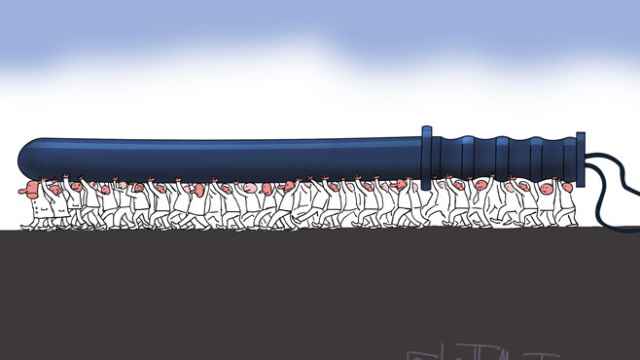At first glance, it seems as if the Russian authorities responded perfectly to the tragic collapse of military barracks at a paratrooper training center near Omsk that killed 24 soldiers. Defense Minister Sergei Shoigu and Airborne Troops commander Vladimir Shamanov showed a degree of self-sacrifice by cutting short their summer vacations. Shoigu provided President Vladimir Putin with updates on the situation every 30 minutes from defense headquarters. Rescuers had not yet pulled the last body from the wreckage when investigators had already pulled up documents on the company that had carried out major repairs to the building in 2013. The authorities lost no time in detaining the director of that construction firm and the commander of the training center who had deemed the structure fit for residents.
It would seem as though the authorities were beyond reproach in demonstrating such touching concern for the victims and relentless determination in bringing the culpable parties to justice. After all, irresponsible officials and thieving contractors are a problem the world over. However, a closer look at the story reveals clear systemic problems.
The barracks were first built in the 1970s and the authorities ordered their overhaul in 2013 when huge gaps were discovered between the roof and walls. As usual, the local office of Spetsstroy — the Defense Ministry's federal construction agency — served as the general contractor. However, the Omsk branch lacked both construction equipment and workers. So, as usual, it created an entire chain of subcontractors. The firm Remeksstroy — registered in Nizhny Novgorod and located in a basement office of an old Khrushchev-era building — was the fourth in that chain. It was that company that received the contract after paying off the other participants in the chain. And this even though past clients had filed numerous complaints against Remeksstroy for previous contracts carried out for various siloviki structures. And despite those numerous complaints, the siloviki continued to place orders worth many millions of rubles with Remeksstroy, including a contract to repair a few of the paratrooper training center buildings that was worth more than 2 billion rubles ($35 million).
There are two reasons why the military was so enamored of Remeksstroy. First, it is compliant. Company directors initially told the military brass that the barracks were dilapidated and recommended demolishing them and building a new structure. However, when the military officials refused that option — and they, by virtue of their rank, must certainly know best — Remeksstroy quickly agreed to simply repair it and to the generous sum offered for their efforts. Had the military employed one of the more reputable construction companies in Omsk, it would have had to spend more time and money to carry out the work than was actually required. Second, simple greed helps explain the love affair with Remeksstroy. It was also greed that motivated officials to pocket much of the allocated funding and then give final approval to the building despite its numerous defects. Of course, the commander of the training center might have ordered that soldiers occupy the premises simply because he had to satisfy orders from his superiors. The contractor had almost certainly reported to the top brass that the work was completed back in December, and that left the commander little option but to move his troops in. And now experts are wondering what caused the barracks to collapse like a house of cards.
The sad truth is that most defense orders are placed this way. Military officials always want to carry out their projects quickly, cheaply and so as to line their pockets in the process. They therefore hire whichever contractor most easily makes that possible. And that is why they have a constant problem with individual parts and components of complex military equipment malfunctioning. Recall the string of disasters in Russia's space industry and the failed test flights of the Bulava missile. And keep in mind that six military aircraft have crashed since June alone, including a Tu-95 strategic bomber. The cause is obvious: The old aircraft are repaired using substandard parts. And that points to a more basic problem: The Defense Ministry is at once the customer and the agency responsible for quality control.
It so happens that Deputy Defense Minister Tatyana Shevtsova reported to the president just days after the barracks tragedy that the ministry was closer than ever to eliminating corruption from the defense procurement process. Putin has tried over his entire 15 years in power to overcome this scourge. First, Sergei Ivanov combined the posts of defense minister and deputy prime minister responsible for the defense industry. In that way he personally represented both the government as client and the contractor, and it gave him the power to control subordinates on both sides of the process. Putin later created two whole federal agencies in an attempt to cope with the problem. Rosoboronpostavka, the Federal Agency for the Procurement of Military and Special Equipment, was charged with formulating defense orders to achieve the highest possible quality at the lowest possible price. A second, Rosoboronzakaz, the Federal Agency for Defense Contracts, was charged with ensuring that budgetary funds were spent exclusively for their intended purpose. Sergei Ivanov explained that, in order to reduce corruption, it was necessary to separate Defense Ministry officials responsible for placing defense orders from those responsible for receiving the finished products. Last year President Putin dissolved both agencies as ineffective and returned their functions to the ministries that place defense-related orders: the Defense Ministry, Interior Ministry, Federal Security Service and others.
And now the authorities have come up with an ingenious solution. They have created a sort of interdepartmental system of control by which each weapons order is assigned a unique number according to which all participating contractors are paid. According to this system, all subcontractors open accounts in authorized banks that, Shevtsova claims, must help ensure that the money is spent as earmarked. The main objective of this system, Shevtsova earlier told journalists, is to "stain" or "mark" the cash flow allotted for carrying out the state's defense orders, to separate it from the firm's overall cash flow and to thereby ensure transparency along the entire chain of production.
The idea behind the new law is clear. In recent years the government has increasingly seen the money earmarked for weapons production disappear after the company responsible for carrying out final assembly distributed those funds among the producers of various component parts. That is no surprise. After all, in the mid-2000s, Putin ordered the consolidation of the hundreds of defense industry-related enterprises into a sort of gigantic collective farm that seemed specially designed to ensure that money would disappear without a trace. It is no coincidence that the new laws strictly prohibits companies from transferring money from those "numbered" bank accounts for the purchase of securities and precious metals bullion, or to "charitable organizations" and individuals.
In her report to President Putin, Shevtsova cited the example of a certain plant in the Amur region — presumably the Amur Shipbuilding Plant — where some of the advance funds from the Defense Ministry were used to provide interest-free loans to senior personnel at the plant. Those funds were also used to pay off debts of the plant's parent company and to pay for the services of a foreign offshore company.
The corruption schemes are understandable. What is not clear is why Shevtsova thinks her anti-corruption scheme can succeed. After all, why would an "authorized" bank — after years of working with a factory director to siphon off government funds — suddenly turn around and inform on that factory? The bank would not only risk exposure for previous crimes, but lose that longstanding source of income. Why would a parent company — that had always cheated its subsidiaries that did the actual work out of their rightful profits — suddenly get scared by some "numbered" bank account? Nothing could be simpler than bribing officials at the Financial Monitoring Service and Defense Ministry oversight department. Corruption cannot be cured in an isolated sector with the help of "stained" or "marked" accounts. Putin has created a government that serves the vested interests of its officials, and Russia will overcome corruption only when the underlying purpose of that system changes.
Alexander Golts is deputy editor of the online newspaper Yezhednevny Zhurnal.
A Message from The Moscow Times:
Dear readers,
We are facing unprecedented challenges. Russia's Prosecutor General's Office has designated The Moscow Times as an "undesirable" organization, criminalizing our work and putting our staff at risk of prosecution. This follows our earlier unjust labeling as a "foreign agent."
These actions are direct attempts to silence independent journalism in Russia. The authorities claim our work "discredits the decisions of the Russian leadership." We see things differently: we strive to provide accurate, unbiased reporting on Russia.
We, the journalists of The Moscow Times, refuse to be silenced. But to continue our work, we need your help.
Your support, no matter how small, makes a world of difference. If you can, please support us monthly starting from just $2. It's quick to set up, and every contribution makes a significant impact.
By supporting The Moscow Times, you're defending open, independent journalism in the face of repression. Thank you for standing with us.
Remind me later.







